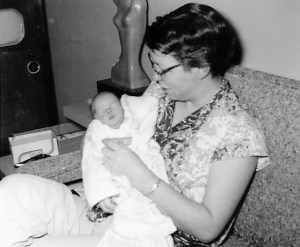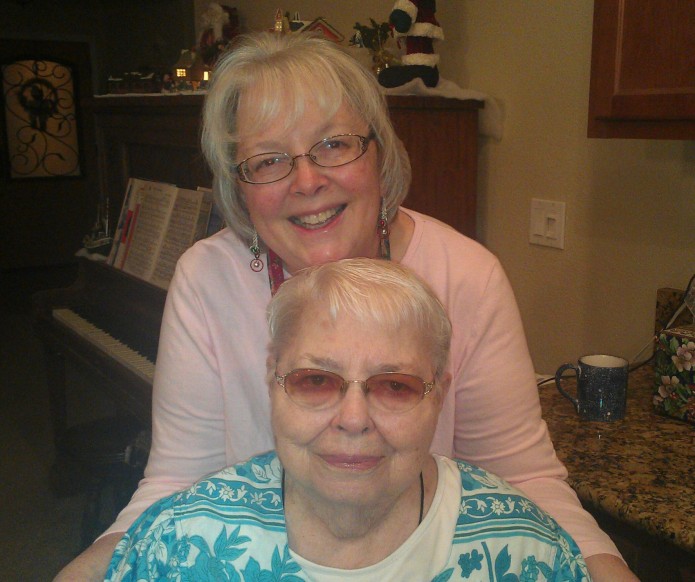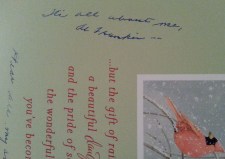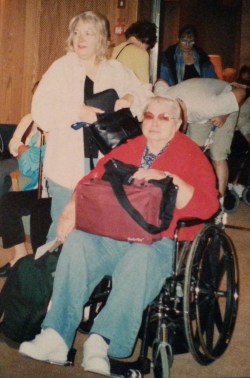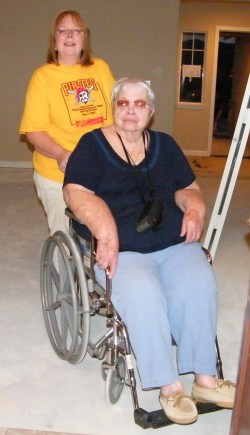The Wicked Witch. That’s how a Wizard of Oz personality test on Zimbio.com once pegged me. “Vile, foul, odious and deleterious to all.” My vocabulary is above average, but I still had to look up the last two adjectives to be sure I understood. Hateful and toxic. Hmmm. OK, I know those online personality quizzes are intended for entertainment and the results are arbitrary, but let me just say this about that …
And the horse you rode in on.
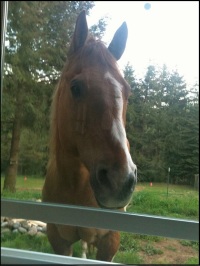 If you’re a regular reader of my weekly essays, you know that my mother and I had a robust repertoire of catch phrases for use on almost any occasion. This one came in handy when one or both of us were annoyed about something or with someone. To be candid, it’s only part of a rather off-color phrase. The opening two words are not appropriate for a family column, and Mom and I rarely, if ever, used them. It was sufficient to refer to the poor, four-hooved bystander. Besides, contrary to the random result of one Zimbio quiz, I have always been the Pollyanna of my family. Vulgarity is generally not my style; playing “the glad game” is.
If you’re a regular reader of my weekly essays, you know that my mother and I had a robust repertoire of catch phrases for use on almost any occasion. This one came in handy when one or both of us were annoyed about something or with someone. To be candid, it’s only part of a rather off-color phrase. The opening two words are not appropriate for a family column, and Mom and I rarely, if ever, used them. It was sufficient to refer to the poor, four-hooved bystander. Besides, contrary to the random result of one Zimbio quiz, I have always been the Pollyanna of my family. Vulgarity is generally not my style; playing “the glad game” is.
Nevertheless, about four months after Mom passed away, “and the horse you rode in on” came to mind pretty much on a daily basis … including those first two uncouth words. I was emerging from denial; the oh-so common stage of grief that allows you to shut out the enormity of what has happened. Although I had watched her life slowly fade, her breathing stop, and the kindly morticians remove her body, my heart could not believe she was really gone. I remember breaking down in tears one evening after work and crying on my husband’s shoulder, “I can’t believe I have to live the rest of my life without her!” It was the truth. I honestly couldn’t believe it.
Anger moved in just as soon as denial moved out. It happened when family from the Pacific Northwest gathered at my house in Nevada to distribute her belongings. It wasn’t enough that I had lost her. Now I had to part with many of the things she held dear. Teacups in our shared China cabinet, elephant figurines from her vast collection, quartz crystals, small animals carved from soapstone, Christmas decorations, framed family photos, books, movies, hats, clothes, furniture. We were scattering her life in much the same manner we would scatter her ashes a few months later.
The only way I could get through that weekend was to convince myself that dispersing her belongings was the best way to honor her. As a Depression-era child, she attached great value to her possessions. Parting with anything was painful for her, which is why a broken bird feeder became yard art under the crabapple tree outside her window and several cracked water tumblers remained in the kitchen cabinet. In a generation or two, I reasoned, very few of her belongings would have meaning to descendants who didn’t know her. Scads of it would end up in second-hand stores with two-dollar price tags. Wasn’t it better for her children and grandchildren to receive and enjoy mementoes that they considered priceless? After all, as the late George Harrison said, “All there is ever is the now.”
This reasoning certainly helped … until I watched everyone drive away with loaded-down cars and trucks. Practically overnight, anger consumed me. Zimbio was right. I became the dreaded Wicked Witch.
Everything that anyone did or said was irritating. At home, I was angry with my husband because our lives had not instantly changed after Mom’s death. We had freedom but we weren’t using it. We didn’t spontaneously stop at restaurants for dinner after work, watch movies in bed, go on outings with the family or do any of the carefree things we had imagined. Our routine was the same; except Mom wasn’t there. At work, I was angry with the mountains of paperwork, the confounding complexity of some procedures, the disturbing lack of documentation for others, and the perceived futility of it all. Our department director had three, simple house rules — “No mean. No loud. No negative.” I was in almost constant violation of the last one.
The reason for this irrational resentment toward every person, place or thing on the face of the Earth completely escaped me. That is, until my brother decided to part with a memento Mom had specifically saved for him. He had his reasons, and he also had every right to make this decision. My intellect was aware of that. Regardless, all of my pent-up anger erupted in his direction through every electronic method available. Text messages and voicemail recordings that must have made his cell phone hot to the touch came pouring out of me. A week or so after both my sister and I had sufficiently alienated him, she phoned me and quietly said, “Um, remember Elizabeth Kubler-Ross’s explanation of the five stages of grief? Maybe you should read it again.” The line went silent for a moment.
A simple “duh” is the best way to describe my reaction. I have worked in social services for more than 25 years; many of those years providing advice and comfort to people in crisis. How could I have forgotten that anger during bereavement is misplaced rage? I was not ticked off at my husband, my job or my brother as much as I was just goldarned mad that Mom had left me. Immediately, I felt the fury dissipate and a sense of calm wash over me. It was like taking a deep, cleansing breath. The Wicked Witch went packing and Pollyanna came home.
In the weeks following the disagreement with my brother, apologies were extended and our respective parts in the debacle were acknowledged. Still, the hurt cast a dark shadow over the June weekend we gathered at the Oregon Coast to scatter Mom’s ashes. Since then, a few brief text messages, perhaps one phone call, and an occasional comment on a Facebook post have comprised the sum total of our communication. Last weekend, that finally changed.
On Friday I hitched a ride to Oregon with my son and daughter-in-law. My son, an electrical contractor, needed to finish some work on my sister’s kitchen remodel, and I saw it as a perfect opportunity for a visit. On Saturday my sister and I went to see our brother and his family at their small farm across the Washington state line. He had initially responded to her text message with a litany of irrelevant excuses; the kind one dreams up as a diplomatic way to say “no.” She replied that we were coming anyway. It was a bold move to melt the glacier that had formed between us, and it worked.
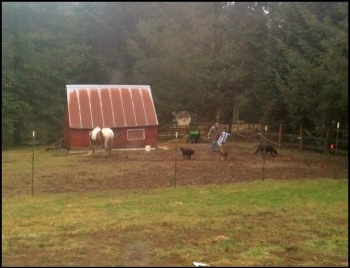 As soon as I saw my brother, I began weeping. To be fair, I wasn’t crying just about our estrangement. Lack of sleep over another matter had made me particularly vulnerable. Sometimes, though, destiny has a way of mystically weaving unrelated experiences together, and my tears triggered an immediate thaw. My brother took me in his arms and told me everything was all right. Then he said, “I know what will make you feel better. It always makes me feel better when I’m sad.” At his behest, I changed into his wife’s work boots and sweatshirt and followed him down a muddy trail along a line of tall fir trees to the old red barn at the bottom corner of the pasture. The air was clean from recent, heavy rain, and the scent of hay drifted from the stable like heavenly perfume.
As soon as I saw my brother, I began weeping. To be fair, I wasn’t crying just about our estrangement. Lack of sleep over another matter had made me particularly vulnerable. Sometimes, though, destiny has a way of mystically weaving unrelated experiences together, and my tears triggered an immediate thaw. My brother took me in his arms and told me everything was all right. Then he said, “I know what will make you feel better. It always makes me feel better when I’m sad.” At his behest, I changed into his wife’s work boots and sweatshirt and followed him down a muddy trail along a line of tall fir trees to the old red barn at the bottom corner of the pasture. The air was clean from recent, heavy rain, and the scent of hay drifted from the stable like heavenly perfume.
“Here you go,” my brother said and filled my cupped hands with apples freshly quartered from a stash in a nearby plastic bucket. “You know how to feed a horse, don’t you?” I nodded. Tank, a four-hooved giant with kind eyes and a gentle soul, poked his head out of his stall. Slice by slice, he carefully nibbled the sweet fruit from my open palm. When the treats were gone, I caressed Tank’s rust and white muzzle and stroked his powerful shoulders. I kissed the air, he leaned in close for a soft smooch on his nose, and my soul surrendered to the serenity enveloping a green, wet hillside on a misty Washington morning. In that precious moment, the catch phrase Mom and I had assigned to annoyances took on a sweet, new meaning.
To my brother, if you’re reading this, you were my knight in shining armor on an October day that will forever be a cherished memory. With all my heart, I love you …
… and the horse you rode in on.
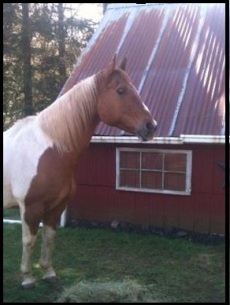
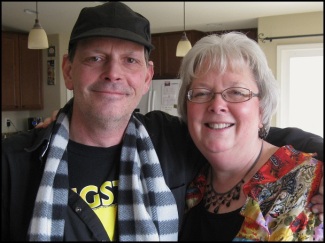
(Photos of horses, pastures, barns and all that is serene — courtesy of my sister-in-law, Lori. Big smiles courtesy of enduring love.)

